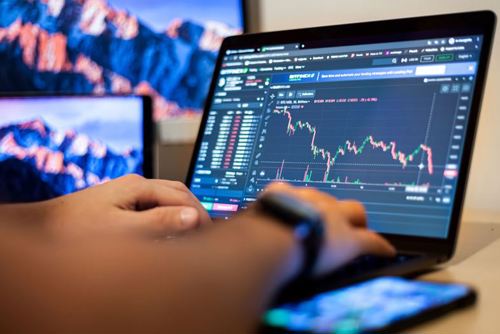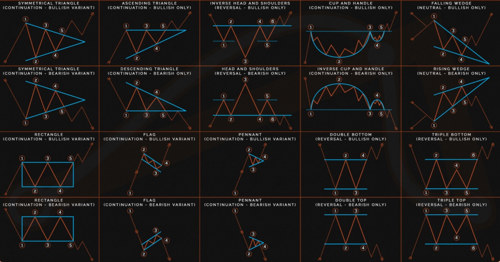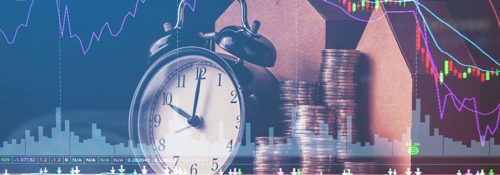
Blog
Common Forex Trading Mistakes and Ways to Avoid Them
Hello, everyone. This article is going to be part 2 of forex traders' most commonly made mistakes. Rather than only defining them, we will also give you hints on eliminating their effects.
As with everything you do, there are also risks of trading currencies on the foreign exchange market. What makes these risks more complicated is the fact that there are internal and also external factors that lead you to make mistakes in your transactions.
Therefore, new participants in the market should never underestimate the importance of, experience, financial education and risk management skills in order to evaluate the commonly made mistakes in the Forex market.
In this part of the tutorial, we will give more details about the other common mistakes. To have more information do not forget to visit part 1 of this series.
1- Trading just to trade
Although Forex trading is rewarding and pretty exciting, traders should not approach trading as if it is a game. One of the biggest mistakes traders make is to trade just for fun. This habit either arises from uncontrolled emotions or lack of understanding about how traders should trade. Successful traders do not get paid to trade. They profit by controlling risk and placing bets where the upside much exceeds the downside. As a result, traders should often refrain from taking any action because there are no profitable bets to be placed.
Beginner traders struggle with this since the majority of people are conditioned to think that staying passive is always preferable to taking action. Doing nothing is frequently far superior to any alternative when it comes to currency trading and all other types of capital management. Successful traders develop the ability to spot these times and avoid the market.
Simply because of boredom, many traders often suffer from overtrading. Without any money at stake, no one prefers to watch price changes and viewing charts. But doing this kind of trading purely out of boredom turns trading into gambling. Keep in mind that every time you trade, you also incur transaction expenses.
It is important for traders to keep in mind the virtues of patience and the fact that no one ever ran out of money from not trading. Traders must be selective with their trades and avoid overtrading.
The best that can happen as a result of excessive trading is that the trader's capital is destroyed due to high transaction fees. The worst case scenario is when a trader makes a large number of unfavorable deals that go against them and cause them to lose money.
Please do not open a new position just because you have nothing to do or simply you are bored. Success in trading depends on discipline so traders should be consistent and follow market trends, news or economic decisions all the time. Remind yourself that you have a strict plan to follow every time you exit a trade, regardless of whether it was profitable or not. Don't start trading once more only to get back into the market. Instead, you should exercise more patience and concentrate on making planned trades.
2 - Not Understanding Leverage Properly
Second common mistake we will mention derives from the lack of comprehensive understanding about leverage. Leverage simply helps traders to open a larger position size than their initial capital would allow. Since most major Forex pairs don’t move more than 1% a day, Forex traders use leverage to magnify the profits because it enables traders to borrow money from their broker.
For instance, leverage may allow traders to open a position 100 times larger than your account size. However, it both magnifies investor’s profits and losses. So, It's important that forex traders learn how to manage leverage and employ risk management strategies to mitigate forex losses.
You can trade with more money than you have in your trading account thanks to leverage and margin trading, which are amazing instruments that provide you greater market exposure. However, you will only profit from this if your technique is continuously effective and your expectations are optimistic.
Because of this, if excessive leverage is not understood and appropriately managed, it can quickly deplete your trading cash.Although using leverage is common in the forex markets, traders must be aware of the proper level of leverage. Using excessive leverage during a trading session is a common forex trading error. The error of utilizing excessive leverage to execute a single transaction or a series of connected trades is much worse.
It's just as risky to have multiple open leveraged transactions as it is to place bids that are excessively large relative to the balance of your entire account. Correlated trades may move in the opposite direction of one another and might result in losses. There is a general rule that can prevent you from using too much leverage in addition to making fewer trades and making them smaller. It advises that the entire amount of possible losses shouldn't be greater than 5% of your money.
Trading professionals should evaluate leverage objectively, recognizing both its advantages and its risks. Trades can be profitable with little capital if there is a lot of leverage. Traders who are using excessive leverage run the risk of losing everything if a currency moves against them, even in a small, temporary fashion.
3- Falling into a trap of overconfidence
Excitement and enthusiasm that comes from successful transactions might lead to opening positions with a lack of well thought analysis. The euphoria coming from a successful position could lead traders to run into another position with their newly earned capital. This may cause them to lose or even damage all their earnings on their account.
This type of trading mistake occurs when traders are controlled by their emotions to be able to earn more money. After a series of successful trades, it becomes easier to fall into the trap of overconfidence. This feeling could fog your judgements and decision-making mechanism to enter into another position without having any critical thinking.
Unfortunately, winning a series of trades does not guarente big returns but rather it might go in the wrong way. Most of the traders who risk large amounts of their capitals could experience great losses in the long term. A general rule is that a trader shouldn't risk more than 1% of their capital, professional traders even take a far smaller capital risk than 1%.
On the other side of this common mistake, there is revenge trading. Although it is a perfectly normal temptation, it is important to know the ways of eliminating its effects. Revenge trading is the desire to immediately return to the market after suffering a loss in an effort to recover your lost money. Similar to becoming overconfident after winning trades, revenge trading after losing trades can damage your ability to make reasonable decisions and frequently results in further losses.
Revenge trading is the desire to immediately return to the market after suffering a loss in an effort to recover your lost money. Similar to becoming overconfident after winning trades, revenge trading after losing trades can damage your ability to make reasonable decisions and frequently results in further losses.
When trading, always aim to maintain objectivity. The best course of action after a run of losses is frequently to sit back, stop trading, and analyze what went wrong before running the risk of more losses. Following your trading strategy can help you avoid this. A profit suggests that a strategy is effective, and it should support your prior analyses and predictions rather than serve as encouragement to do so.
4- Over-reliance on tools
Newcomers in the market tend to heavily rely on indicators to make trade, believing that this is the best way of earning greater profits. However, in practice, traders must acquire the ability to interpret a price chart on their own. Traders can better understand market dynamics and how to interpret different indications by regularly examining these charts. To put it another way, while sophisticated tools may be attractive, they prevent long-term progress since the trader never becomes familiar with the fundamentals of market action. Even if Forex trading takes place online, success still depends on mastering the "old school" principles.
Traders can benefit greatly from some trading tools, and systems like MetaTrader 5 provide complete automation and individualized customization. However, before adopting software-based solutions to open or close a position, it's crucial to comprehend both the benefits and drawbacks of each.
The main advantage of algorithmic trading is that transactions may be completed considerably more quickly than with manual systems. Automated trading systems are growing so sophisticated now that they may soon revolutionize how humans engage with the markets.
But since algorithm-based systems are only as reactive as they have been programmed to be, they lack the benefit of human judgment. Because shares and other assets are sold quickly in a market that is temporarily declining, these methods have historically been blamed for market flash crashes.
5- Ignoring the effects of economies
Not comprehending the underlying economy of the foreign exchange markets is a common mistake made by forex traders. The majority of forex traders are technical investors. Even still, knowledge of the underlying economies' foundations is not an acceptable defense.
When a trader misunderstands a basic aspect of the underlying economy, it won't make any difference how well-informed his or her technical analysis is and won't matter how much money the trader makes.
At the very least, traders should try to grasp the variables that influence supply and demand for the currencies they trade, as well as how and why those factors can change in the future. A trader will then be able to recognize the moments when fundamental issues may supersede technical considerations.
6- Failing to stop losses
A serious mistake is to resist the urge to hold onto lost deals in the hopes that the market will turn. By not cutting losses, a trader risks losing any profits they may have gained elsewhere.
This is especially true for trading strategies such as day trading or short-term trading, which depend on swift market moves to generate profits. There is minimal benefit in attempting to weather brief market declines because all open positions ought to be terminated by the conclusion of that trading day.
Stops can close a position that is moving against the market at a predetermined level, even though some losses are an unavoidable aspect of trading. By limiting your losses, this can reduce your risk. In order to automatically cancel your trade after it has generated a particular amount of profit, you could also add a limit to your position.
It's important to keep in mind that stops don't always shut down your transaction at the exact level you stated. When you keep a trade open over the weekend or overnight, the market may suddenly move from one price to another with no trading activity in between. Slippage is the name for this.
Guaranteed stops reduce this risk by automatically closing trades when they reach a predetermined level. Some providers charge upfront fees for this protection.
Final Thoughts
As no one can deny, being a successful trader is something that takes time and great afford to achieve. This long and difficult journey might be even more compelling in case one falls into the trap of commonly made mistakes. Therefore, it is a vital act to identify and try to find a way to eliminate the effects of those mistakes to position yourself better than many others.
On the other hand, you should also accept that trading mistakes are the natural part of most trading habits and even the most professional traders make those mistakes in their daily lives. What is important is to be aware of those common mistakes in order to minimize your own mistakes and boost your returns. So, don’t be afraid of making any type of mistakes but focus on learning any possible things from them. Learning from your mistakes and planning an action to avoid them happening in the future is what matters.
One of the other ways of eliminating the detrimental effects of commonly seen mistakes is to choose the right platform that will help you to access trustworthy news sources, dependable real-time feeds, a clear trading interface, and a wide range of trading signals. The software should also give you access to small and exotic currency pairs that you find interesting in addition to main currency and cross-currency combinations.
Arya Trader helps its customers by providing financial education tools, customized service and advanced platform with more than 20.000 robots that especially eliminates the emotional factors and makes the most-rational decision for your trading activity.
Be sure to look over your trading plan one more time, be in the appropriate state of mind, and remember to follow your money and risk management principles before you begin your trading day. Always maintain emotional control when trading. Finally, do not forget to visit aryatrader.com to have more information and advance service that will boost your earnings.
We all wish you a profitable trading.
1- Ignoring the News and Economic Data
Currency pairs tend to be affected by the decisions of authoritative institutions such as the central bank or the news concerning economic data.
Paying attention to news and events is a great idea because they can be quite important in determining movements in currency pairs.
Relying too heavily on the news.
Beginner traders tend to make the mistake of trading right after hearing a positive news headline. News headlines are dangerous, however, because of the lack of liquidity. This means that the market assessment triggers a whipsaw-like action where money turns quickly in either direction, swinging the trade back and forth. In these events, potential losses are greater than usual.
Ignoring economic data and news events/ Pre-Positioning Forex Trades for News/Forex Trades After News Hits


